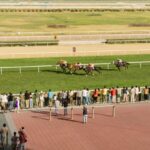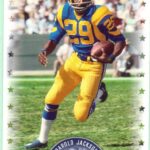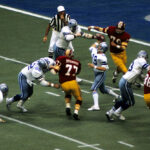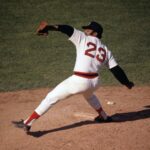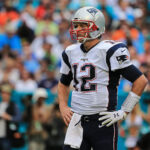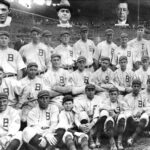The Beginning of the End for Bjorn Borg, Part Three
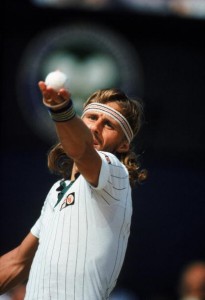
The 1981 season proved to the final one of Bjorn Bjorg's career.
The Iceman Melts Away…
It was like being evicted from your neighborhood playground where you practiced ball all of your life, where you reigned as King of the Mountain, swatting down the little kids who scrabbled toward you to reach the top. That is what Bjorn Borg felt like after being dethroned during the trophy presentation at the conclusion of Wimbledon in 1981.
This new kid, this John McEnroe, was taking away his perch and making him feel ordinary. So what do you do when someone invades your kingdom and steals your crown? You storm his castle and try to take what belongs to him—tit for tat or an eye for an eye.
This, according to Lesley Visser of The Boston Globe (Sept. 1, 1981), caused Bjorn Borg to declare that winning the U.S. Open was his greatest passion—which he had been trying unsuccessfully to accomplish since he was 16 years of age.
At the time he uttered this fateful sentiment, Borg was 25 years of age and had been playing professional tennis for 11 years, since the age of 14.
Coming into the U.S. Open ranked No. 2, the rumor mills were buzzing. Many players whispered that Borg was finished, generally blaming his marriage. How typically male to always blame the woman for the man’s downfall.
At this point in time, Borg and McEnroe had met 13 times, with Borg barely holding the edge at 7-6. Within those matches, however, Borg and McEnroe each had won 20 of the 40 sets played.
But it was in New York where the American out glowed the Swede. At the U.S. Open, McEnroe, 22 of 24, had only lost twice, while Borg stood at 34-9.
The Tournament
Borg took the first step in his Herculean task of winning his first U.S. Open in 1981 by playing and defeating Swiss Marcus Gunthardt. Borg followed that by defeating David Carter of Australia to reach the round of 16.
So far, so good on his noble quest to seek the one jewel not cemented onto his legendary crown.
Later edging his way into the quarterfinals, Borg took out Yannick Noah, 6-7, 6-4, 6-3, 6-3. Borg would next face big serving American slugger Roscoe Tanner. Tanner always gave Borg fits at the Open.
After quietly disposing of Tanner in the quarters, Borg readied himself to face another traditional foe in the form of Jimmy Connors. Connors overcame Eliot Teltscher to reach the semifinals.
The other semifinal would see John McEnroe square off against fellow American Vitas Gerulaitis. The New York crowd would love the matchups which featured three Americans out of four.
Inevitably, the dream match became reality and U.S. Open fans were delighted at the prospect of witnessing the two greatest tennis players on the planet face each other once again in another monumental showdown.
After being 0-9 would this finally be the year that Borg would conquer his demons and win the Open? That’s the thing about demons, however, they cannot often be denied their devious intent.
Borg might have pulled it off if he did not have to face McEnroe, who had owned this tournament for the past two years, hoping to make it three championships in a row. McEnroe would become the first man since Bill Tilden in the 1920s to win three consecutive U.S. Open titles.
The Match
The inevitable match lacked something in the end. It lacked the fiery determination and calm demeanor of the coolest Swede ever to wield a tennis racket.
The traditionally confident Borg quickly faded from view as McEnroe established his superiority early in the match. The brash American had an answer for everything the Swede threw at him. It seemed McEnroe could even read Borg’s mind.
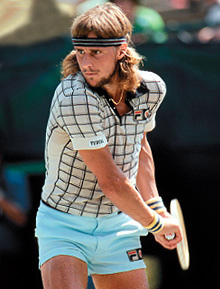
Bjorn Borg finished 0-10 in the U.S. Open.
In the first set, however, Borg delivered 72 percent of his first serves while McEnroe managed only 48 percent. Borg broke McEnroe at love in the seventh game and went on to take the opening set.
But after that sterling first set, Borg only managed 40 of 81 first serves—hardly the quality that was going to keep McEnroe at bay. Once Borg’s serve began to fade, so did his resolve and he appeared strangely absent from the proceedings as the match wore on.
In the second, serving at 2-5, Borg doubled-faulted twice to lose the set. In fact, Borg tossed in seven double faults in the match.
McEnroe was playing the match of his life, well-behaved with his temper totally under control. But it was the breadth of his game, the total gamut of his shots that took the life and the legs out from under the Swede that was so astonishing in this contest.
Take the eighth game of the third set, for example. Borg had broken McEnroe’s serve and led 3-2, holding his own serve to go up 4-2. McEnroe then held serve—taking the set to 4-3. Borg was serving to go up 5-3.
On a Borg second serve, McEnroe hit a deliberate backhand cross-court pass for a winner. Then Borg evened it to 15-15 when McEnroe hit a forehand wide. Borg decided to infuse aggression into his game to combat the McEnroe attack.
Borg hit the ball then rushed to the net. To counter, McEnroe tossed in a delicate forehand topspin lob and Borg was unable to get to it. It was now 15-30.
Borg moved in again after his serve and this time McEnroe blew it past him with a backhand cross court with immaculate touch. On break point, the American spun another lob over Borg’s head.
Borg’s features sagged a bit after being run ragged by McEnroe. The American held serve and then broke Borg in the 10th game to take the third set.
Finally, the inevitable pressure came to bear on the mighty Swede. Pressure that normally Borg exuded just standing on the other side of the net came down full force on the Swede who could not brush it aside or retaliate.
The left-handed McEnroe with his high-kicking serve pierced the Borg reserves and left him defenseless against an unending assault.
As Borg’s spirits sank, McEnroe’s soared, sensing he could do nothing wrong—he was in the zone. Borg never totally arrived in the fourth set, although he remained alive long enough to break back once.
Essentially the match was finished once the eighth game in the third set was over. That game broke Borg’s spirit and his faith in his ability to win. Once confidence is lacking and you begin second guessing yourself, you can kiss victory goodbye 99 percent of the time.
In the end, McEnroe won the 1981 U.S. Open, 4-6, 6-2, 6-4, 6-3.
Then things got really bizarre.
The End…
Borg left the court and did not return. McEnroe was hugging his parents and accepting the polite applause of the New York crowd who really pulled for Borg to win this one.
They had nothing against the American, but they wanted Borg to have the U.S. Open as part of his resume.
For Borg, he just wanted out—out of Flushing Meadows, out of Queens, out of New York, out the the U.S., and, although he did not realize it at the moment, out of tennis for good.
The idea of accepting that little runner-up trophy and standing around while McEnroe pranced for the television audience and the crowd was too much for Borg to witness, let alone be part of—as the main residue of the ceremony.
Borg showered quickly and sneaked out the kitchen with the press following in hot pursuit. The enigmatic, tight-lipped Swede said nothing—just faded out of sight in the back of a Volvo station wagon.
There was talk of death threats and Queen’s Task Force operatives as escorts.
But the real tragedy of this final was the death of Borg’s illustrious tennis career. With 11 majors, including six French Open championships and five Wimbledon titles, Borg was finished.
He had nothing left to give. His confidence was gone, as was his will to change and work harder.
He was the fittest man on tour, but he could read the writing on the wall as newcomers like McEnroe and Ivan Lendl began to better and best him on the court.
All of your life you have been taught how to win. What do you do after you have been beaten and know you will never be the best again?
For Bjorn Borg, the answer was obvious. You leave the game and try something else.
Tennis was never quite the same without the Swede…believe me…
JA Allen is a regular contributor to Sports Then and Now.
